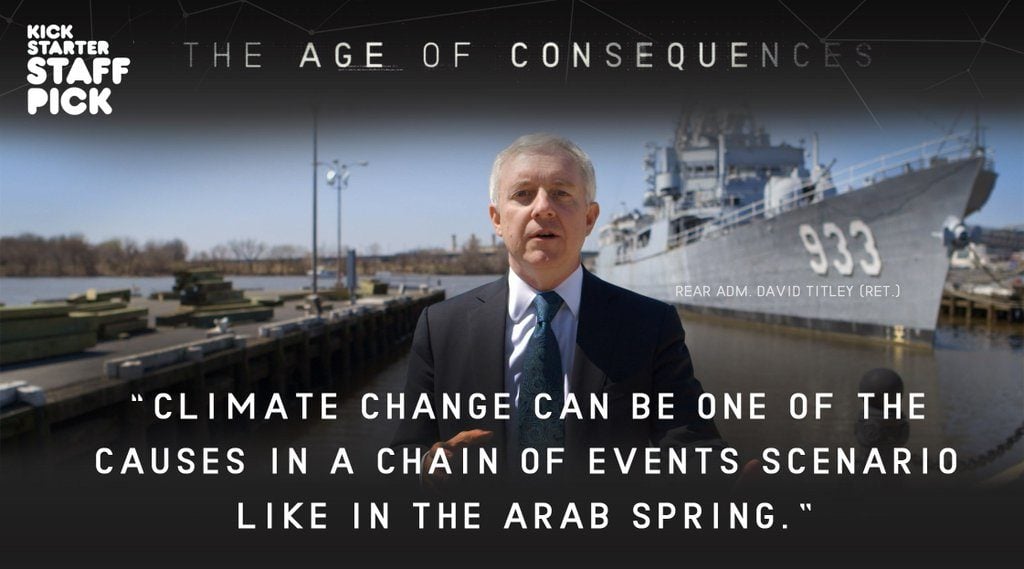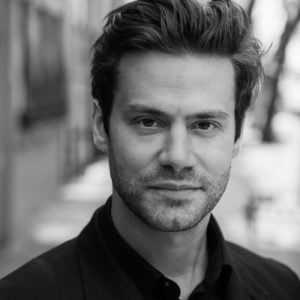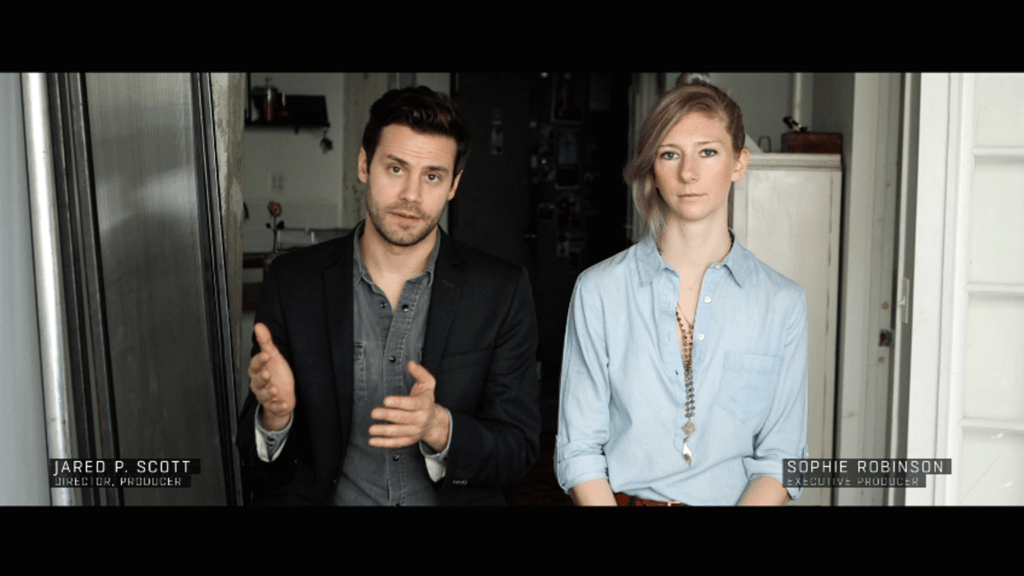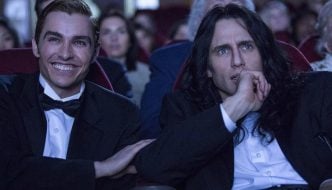Daniel Palmer Interviews Jared P. Scott and Sophie Robinson of The Age of Consequences
June 29, 2016

Following the international premiere of The Age of Consequences at Sheffield Doc/Fest, I spoke with its writer/director, Jared P. Scott, and executive producer, Sophie Robinson.
One of the things that really impressed me about The Age of Consequences is the way you were able to identify the role played by climate change in exacerbating geopolitical conflict. How well do you think this climate component has been addressed in mainstream media coverage of conflicts like Syria and Darfur?
JARED P. SCOTT: I don’t think well. There’s something I refer to as the ‘SportsCenter-isation’ of our media. As you know, it’s all in soundbites. We’re talking about Cable news media. Everything’s condensed down. If you can’t say it in seven seconds, it’s not going to be on air. There’s talking heads and they often debate a lot as opposed to having investigative reporting. There’s a mention occasionally of the national security risk that climate change poses, but it’s not the medium to break down the complexity.
It’s a simple concept: climate change makes everything worse. But in practice you have to see, it’s the way that climate change interacts with other stressers and socio-political factors. It’s really important to understand the complexity of that, and what that cause and effect is, and it all agitates. I don’t think that the TV news media, at least in the US, has the ability to fully make that apparent. When it comes to print media, there’s a lot of good people writing on this, and environmentalists get excited sometimes to be like, ‘look, the military’s talking about this’; and in some way that excited us, too.
But you have to recognise how important it is to get this right. You have to understand how it interacts. That inter-related story we tell in the film, we hammer that down in those case studies you mentioned because we wanted to make sure that the thesis is very clear to the viewer; that we’re making sure people can walk away from the film with something that they can understand and can articulate to others.
Do you think documentary represents an ideal middle ground between cable news and print media in which to explore these issues?

Jared P Scott
JPS: I think there’s been a lot of great print articles about this, but you also suffer from MEGO – My Eyes Glaze Over – where it’s boring but important. A lot of people now consume media in a way that they skim news; you’ll see the headline but you won’t get that robust expose that The Guardian or The New Yorker or The New York Times Magazine will write. So unless you’re seeking that out, a film is a great way to experience this.
We always say, it’s a low entrance barrier; anybody can go and watch a movie. We consume media every day, so to take eighty minutes, no matter what your political persuasion is, you can sit down and watch a movie. So I think we have the ability to use the prevailing storytelling medium of our time to tell this story.
SOPHIE ROBINSON: Film is a great tool for social change. I was actually a grassroots climate change organiser for two years and saw the impact that Jared’s previous films had on organising. People were using them as recruitment tools again and again, even though they were years old. So film has that ability to spark a conversation, and to bring a subject like climate change, that’s so hard for really privileged people to see and feel and taste and experience. And so bringing a film that really ties that all together and brings the viewer into that experience is really powerful and a really important way for people who care about climate change to fight for it, and reconnect with why they’re fighting.
Thinking more about effects than causes of climate change, do you think the Arctic is going to become a military flashpoint in the not-too-distant future?
JPS: From what I understand about the Arctic, there is going to be tension there, but ultimately there’s going to be a pie, and it’s going to get split up. It’s going to be more of a legal battle. I don’t see us actually fighting. From what I understand, you’re looking at more of a legal situation; there’s going to be geopolitical tensions, but I don’t anticipate all-out war.
SR: Well, Russia has already planted its flag on the sea floor.
JPS: That was more of a publicity stunt. You have to recognise that someone’s going to get a smaller piece, and it’s probably not going to be the US. But from what I’ve read, I don’t see war happening. What you do see is these low-intensity conflicts that flare up and flare down but basically never go away. You’re looking at counter-insurgents kind of indefinitely, and that’s, I think, the frightening thing. You’re going to see that mostly in the weaker states, as opposed to this all-out nation-versus-nation war. Although I think it can escalate.
These aren’t my words, these are the words of the people that we interviewed, but at the end of any escalation, once you have all these compounding risks, there is always the chance that there’s some kind of weapon of mass destruction, whether that’s a terrorist group or a nation. There’s human error, there’s fragility, and I think it can always escalate. But it seems right now that what we’re seeing is these lower-intensity conflicts; there’s civil wars, there’s inter and intra state conflict, but it’s not the traditional sense of nations versus nations.
SR: The other thing to keep in mind is that climate change doesn’t necessarily equal conflict. Climate change is the problem, and like any problem, that presents a challenge. We can respond to that, nations can respond to that, in a number of different ways. It could be an opportunity for peace, for a way to look at justice, or building resiliency, or it can be conflict. It depends on all those pre-existing, underlying variables and tensions that will shape how we respond to climate change. But it ultimately is just a challenge like any other.
What kind of threat do you think the passage of trade deals like the TPP and TTIP pose to combating climate change?
JPS: There is that conversation. In the US there are a lot of people that are against government regulation; and if we’re going to solve this problem, we do need more regulation; we do need to have a carbon fee; there is going to have to be measures by governments. We just had a global pact, and there needs to be implementation and accountability there. In that, there is going to have to be legislative measures.
When we have something like the TPP and TTIP coming into play, and you have this idea where corporations can potentially sue for perceived lost profits on the implementation of legislation for environmental regulation, that’s astounding, and I hope that we see a big backlash against that. We are going to have to have prescriptive measures and we’re going to have to have that accountability, and that’s a problem when you have things that are going to undermine the ability to do that as a collective society.
Can neoliberalism co-exist with sustainability?
JPS: I think there is this realisation that our way of life has put us in this predicament. I think people are, like: ‘great, it can be a market opportunity’. I don’t know if the market is fundamentally capable of dealing with this problem. I think there are people that are going to be able to use the market to make renewables cheaper, there are some market principles that can play. But you can just as easily bet the other way. There’s money to be made off of climate change; but there are market principles in place to bet against the fact that we’re not going to do anything. And that’s a pretty good bet, because no-one has really done anything. With all this awareness, there’s been an acceleration of our emissions. As a market opportunity, I think it’s convenient for people to think that, because that means we don’t have to change anything. Those principles get certain results, but often not the results we need.
Do I think that neoliberalism can exist with a society? No. You can’t just have endless growth; these neoliberal policies have undermined a lot of the areas where conflict is now a problem; they’ve made it fundamentally weaker for these cultures and societies to deal with climate change. We’re going to have to at some point have a reckoning about the way the economy promotes endless growth and the fact that our planet can’t sustain it. We live on a finite planet with finite resources; this idea of infinite growth is not compatible. Until people realise that the economy is a subset of the ecology, and not the other way around, I don’t know if we’re going to have the shift in our mentality to actually deal with this.
Another striking feature of the film for me was the fact that economic solutions are never brought up by the people you interview. There seems to be no discussion of the fact that we need to fundamentally change out economic model; it’s either military solutions or solutions within the existing economic framework.
SR: We tried to stay away from it being an advocacy piece, so we didn’t want to have anything at the end. It’s not an after-school special where we’re advocating for a carbon tax and to switch your light bulbs. We wanted to stay as neutral as possible. It was a look at the consequences, that’s really what we wanted to stick to; to keep the message clear and direct.
JPS: We were also very clear about saying that there’s a difference between a risk assessment and risk management. Just because the military is recognising the problem doesn’t mean that they’re going to solve it. We’re saying in the film that they are not the best people for it. In a lot of countries, definitely not; but in the US too this is not a good idea. You don’t want militaries to solve what are fundamentally civil societal problems. I think that’s why they’re making their voices more heard; they see the potential for that capacity issue; they see the potential for more conflict, and they’re not chomping at the bit to get involved in this. I don’t think people want to militarize this issue. I don’t think we want to have armed adaptation, which we allude to in the film, or some kind of hunkering down where militaries start protecting the richer societies of the world. It’s pretty easy to see that these consequences are a problem, and therefore that should compel one to do something about it.
Thinking about the barriers to changing things, is so-called ‘greenwashing’ as much of a threat to progress on climate change as climate scepticism?
JPS: I think we make a very sobering point in the movie that there’s no point talking about all these negative things if we didn’t realise that we have the tools and we don’t actually know what our limits are. We’re not collapsitarians about this. There’s no doubt this is going to be an uphill climb; time is not on our side. I think that we make that pretty clear, and I think that anyone who knows the issue understands the enormity of this challenge, and the fact that we are locked in to certain consequences.
But at the same time you have to be hopeful. We can’t just throw up our hands and give up; there’s no courage in that. People should be wary of greenwashing writ large, because I think that only through a sobering optimism, only through a mature sense of hope, can we actually face the truth of what we’re truly up against. That’s something that gives me more fire than just, like: ‘oh, it’s going to be okay’.

Jared P Scott and Sophie Robinson
SR: We also steered away from any green interviewees like Bill McKibbon or Naomi Klein. So none of our interviewees were saying: ‘well, it’s capitalism’s fault, well it’s the Republicans’ fault, well it’s Congress’s fault’. We didn’t do any of that. We tried to stay neutral, even slightly to the right; we took a military perspective. Our hope was that it defuses the greenwashing, it defuses the partisanship.
The other thing is that we made a film about the consequences of climate change, which I think some other films have tried to tackle, and there’s been pushback about that because a lot of them are so overly dramatic. You’ll see the Empire State Building being washed away and things like that. We didn’t do that. Most of the film is a historical perspective on things that have already happened and how climate change has interacted with them. We try to take a very realistic viewpoint on how climate change is a threat.
JPS: Even when you’re looking at it at its most conservative level, it’s still really alarming. Even when you look at the conservative estimates, and you base conservative judgements off of those conservative estimates, you get what we talk about in the film. Whether it’s the forensics and the autopsies that we show in our case studies or the possible futures, it is very frightening stuff. It’s not that people are alarmist about this, it’s just that the science is alarming. We did stay away from that. When you see these conflicts and the violence and the loss of human security and dignity around the world, that’s stuff that really keeps me up at night, and that’s very sobering and powerful stuff in its most conservative form. We didn’t get into the future scenarios, which can be really frightening.
I think what sets The Age of Consequences apart from the majority of climate change docs is that it doesn’t come from within the environmental movement. It’s not an activist film as such. I feel with a lot of those films that they’re preaching to the choir to a certain degree, and this film feels like it’s reaching out to other sections of society.
SR: The reason why we made this film is because we wanted to step out of that climate choir. I came from a climate change activist background, and we talk about the spectrum of allies; that goes from active opposition to active ally, and the biggest chunk is neutral in the middle. In organising, what we’re constantly trying to do is shift everybody toward more active allies. If we can get that huge neutral category to shift to passive ally, or then even to active ally, that’s how you win social movements. Our approach to the film is how can we target a new chunk and shift that spectrum? Because all of the climate change films that I’ve seen are targeting those active allies. So how do we target the neutral, or the passive opposition, or even the active opposition, to become more active toward active ally?
JPS: I’m glad that we are reaching out, and I think that we are going to change minds. As filmmakers, we have the ability to challenge people’s thinking, change people’s thinking and give them a tool that they can use to educate themselves and others. But we do need everyone. So we’re here at a film festival, there’s a certain type of crowd that usually comes to film festivals; we need all those people. There’s environmental groups; we need them too, there’s no doubt about it; they’re used to organising around films. We also need to try to reach out. As Sophie mentioned, we need to attack that spectrum of allies.
The one thing I wasn’t anticipating was the policy possibilities with this film. We always talked about the spectrum of allies for people, but I didn’t anticipate the policy interest as much. Because we always talk about that when we make films; we want to also play it at the Pentagon. But actually the Pentagon does want to play it; we do want to play it on Capitol Hill with all these grasstop organisations; The US State Department may take this film and run with it. That could be really exciting, because we’re going to reach all these people. Policy makers get so many things thrown at them, they don’t always have time to be informed; oftentimes they’re getting a run-down from their chief of staff. So to watch a film like this could be really helpful to those in policy positions as well as the public.
SR: The messenger is so important for any issue; and we have messengers in this film that have never been in a climate change film before. Nobody’s seen military people talk about climate change, and we bring that to light. We’re hoping that that will defuse politics, defuse any of the finger pointing, and it will be accessible to both parties, which is something that a climate change film up until this point really hasn’t been able to achieve.
Do you think it will take an initiative like that for climate change to occupy the same space in the public mind as terrorism as a genuine, existential threat?
JPS: I remember after the UN Climate Summit in 2014, Obama gave an incredible speech on the floor recognising the popular movement that was coming out to march in solidarity about the need to address climate change. I think a couple of hours later, he announced that the US was going to start bombing ISIS because they’d just taken over a dam in Mosul. And I was like, oh God, if you just would have waited, because now that’s all the news. But funnily enough, as we explored this film we actually recognised that there’s a climate element there. As we explored Syria and the rise of ISIS, there’s a political story there, there’s an ideological story there, but there’s also this climate story that is underneath all that.
I don’t know how we get people to have a more robust conversation, because it’s really hard to have a more well-informed discussion. It just doesn’t happen. I don’t know if it’s the TV news doing a better job, or people realising that they have to have a better sense of media literacy and find ways to ingest these big, critical issues of the day in ways that aren’t reductive, in ways that don’t have vitriol, that don’t have a perceived sense of false balance. We have to seek that out; that’s on us; you have to break out of your own echo chamber. The amazing thing is it’s there, but the more information we seem to have the less we seem to know. As a society, if we demand that, if we seek that out, people will change; but obviously people are ingesting this sound-bite, talking head-driven news media and I don’t think you’re going to get that, you’re not going to get much of it unfortunately.
SR: On Capitol Hill, climate change is one of the eight main threats of the twenty-first century, along with weapons of mass destruction and terrorism. It’s just that the people don’t perceive it as such yet. Our government does, our military does. With the media, climate change should be one of those topics; it is as important as those. And although climate change doesn’t equal terrorism and doesn’t equal conflict, it can exacerbate it along with other consequences of climate change. So I think showing that link but not oversimplifying it is really important, so that people understand how climate change can exacerbate terrorism and other threats that are on the minds of most Americans.
JPS: In our film we explore these autopsies and these forensics, but in Syria there was a quantitative study where we saw that drought was two to three times more likely because of human-induced climate change. Sometimes we have the benefit of those autopsies, but oftentimes we don’t always know. So I would advise people not to jump to always play the climate change card, and it’s okay to recognise the uncertainty and the blurriness of it. Because the philosophical thing you have to understand is that everything’s changed. We can no longer distinguish an act of man from an act of God.
We always have to interpret everything with the understanding that we’ve left our fingerprint on the climate. When events happen, you don’t always know, and that’s the problem. I think by the time we’re able to identify what a climate refugee is, it will be so blurred at that point. All these issues are interrelated, nothing is mono-causal; to fight or flee is a big decision, and you don’t do that based on one thing, so it’s tough to call someone a climate refugee. They’re leaving because there’s not economic activity, because of resource scarcity, because of conflict; some of that conflict is climate-induced.
When you step back and recognise how we’ve fundamentally altered the atmosphere, that we’ve fundamentally altered our oceans, that human interference on this planet is real, therefore you have to recognise that too when you interpret all this stuff. That philosophically for me is so important. 150 years ago you could have been, like, the gods are crazy, and you would have been right. We can’t say that anymore, because we fundamentally altered the chemical composition of the atmosphere. That to me is just mind-blowing.
The film does paint a very grim possible future. In researching and making the film, have you become more pessimistic about the future, or do you see a possibility that human ingenuity will find a way of mitigating the effects of climate change?
JPS: I am cautiously optimistic. I don’t think there’s any courage in being a collapsitarian, and just saying that we’re all fucked. It’s also a really privileged position to think that we’re all fucked and therefore whatever. Right now, there are people in certain parts of the globe that don’t have the benefit of just saying: ‘well we’re fucked, c’est la vie’. People that are incredibly hopeless still have to find hope to stand up and fight, and that always inspires me. If we don’t find that courage, if we don’t keep talking about this, if we don’t keep challenging ourselves and the people we know and our political leaders then surely we know what’s going to happen. We don’t know what’s going to happen if we all keep trying, but we know what’s going to happen if we don’t. It’s just going to be cataclysmic disaster.
Now we know that we’re baked into certain things that we have to accept, even if we all stated riding bikes tomorrow, and that’s a tough pill to swallow. But everything that we can do to mitigate is felt equally. Adaptation surely has to happen, and will happen, but you’re going to have winners and losers at adaptation. Even if the industrialised world adapted, all that money is going to go to adaptation. How much of that is going to go to the developing world? Those who contributed the least to this problem will suffer the most. With mitigation, everyone’s going to benefit; the sooner everybody stops emitting, the sooner we change the industrialisation of our food, the sooner we get off fossil fuels in every aspect of our lives, everyone will benefit globally. It’s a very equal way to look at this as a solution.
It’s going to be a tremendously difficult challenge, because the world runs on this single source, but we need to do everything we can to work in that direction. With our film, the first step is for people that don’t recognise this, see it as an esoteric environmental problem, to see this as a true problem; and therefore we hopefully have better, more productive conversations about solutions. A lot of the solutions do exist, we just need to find the will.
SR: When people ask me: ‘are you optimistic?’, my response is: ‘optimistic about what?’ What angle are you taking? Am I optimistic that everything will be the same and fine? No. That’s not going to happen. Am I optimistic that the human species will survive? Yes. I think we will. Am I optimistic that people aren’t going to suffer? No. Because they are. But I think we will tackle this problem. We want to survive; that’s in our DNA, that’s so fundamental to our species. And so once people wake up and realise this is actually an issue that is threatening our species, then I think they’ll wake up and be, like: ‘oh yeah, we want to survive, of course we want to survive, we’ll do stuff about it, let’s get behind it.’
But until we get to that point when people are really putting their political will behind it, it’s going to continue to be a problem and people are going to continue to suffer and die from it. I am optimistic that the species will survive; but I think it will only happen once we really wake up, take this full-on, accept what a big problem it is and address it as such.
Follow Daniel Palmer on Twitter at @mrdmpalmer.
Filed under: Film, TV & Tech
Tagged with: arctic, climate change, docfest, documentary, film, greenwashing, Sheffield, the age of consequences, TTIP, TTP



Comments